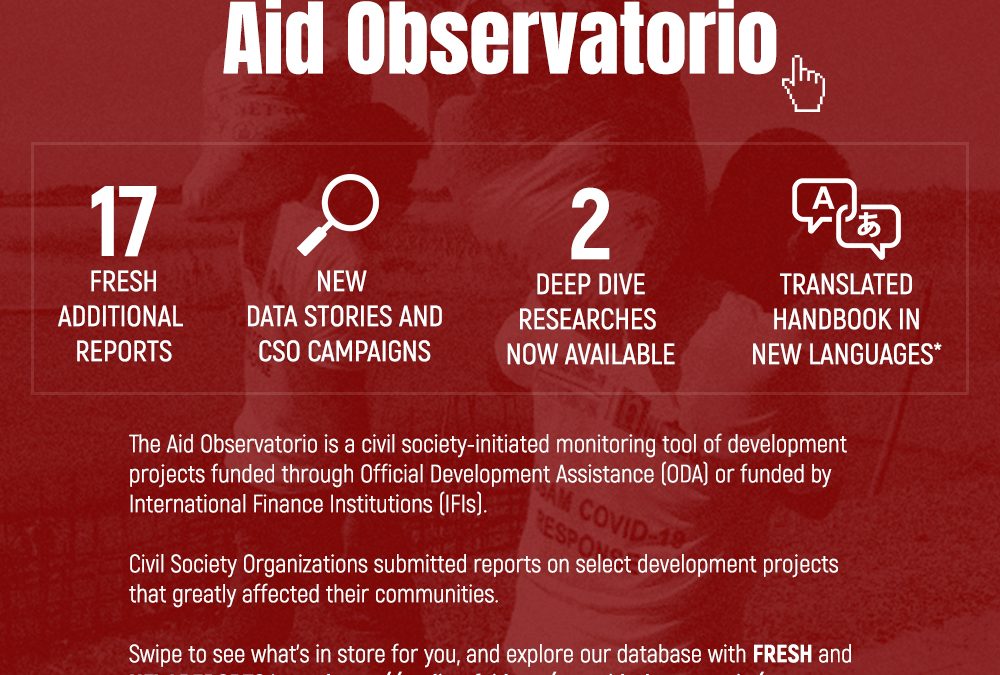Deep Dives are working papers that discuss emerging trends and key issues related to Reality of Aid-Asia Pacific’s thematic areas and how these affect marginalized and vulnerable sectors such as women, Indigenous Peoples, and rural communities, among others. Deep Dives seek to inform Reality of Aid-Asia Pacific (RoA-AP) members, development actors, and the public on evidence-based data regarding aid and development cooperation in the region and beyond.
RoA-AP is currently looking for two (2) writers to produce a Deep Dive on (a) the Triple Nexus approach and (b) the nature of Chinese aid in the region of Latin America and Caribbean (LAC) or Africa.
Triple Nexus and donor interests
Official Development Assistance (ODA) or aid remains insufficient to address the multiple crises the world faces today, including increasing militarism and conflict. In addition, donor agenda and interests have long tainted the disbursement of much-needed aid to developing countries. The securitization of aid has promoted geopolitical and security interests of donor countries over the peace, security and welfare of people living in fragile and conflict-affected states. For instance, in the Asia Pacific region, US foreign policy and security interests shape their approach to aid and development. While this affects the amount and manner of ODA being given to recipient countries, donor programming also contributes to worsening conflict and fragility.
Last 2019, the Organisation for Economic Co-operation and Development’s Development Assistance Committee (OECD-DAC) adopted the recommendation for the Triple Nexus or humanitarian-peace-development nexus approach. The recommendation aims to promote a strengthened and coherent response by humanitarian, development and peace actors to the multi-dimensional crises brought by conflict and fragility. The approach also emphasizes how donors must address the root causes of conflict and fragility, in addition to providing immediate assistance. While the Triple Nexus is still in the early stages of its implementation, donors have the propensity to pursue their interests even in addressing issues of peace and security. Therefore, the Deep Dive aims to examine how donor countries’ nexus approach is shaped by their geopolitical, economic and security interests, and its impact on people living in fragile and conflict-affected states.
Chinese aid beyond Asia Pacific
China has been expanding its relations beyond the Asia Pacific, increasing investments and disbursing development finance to Latin America and the Caribbean and Africa. While partnerships have only been recently formed with these regions, China has been making strides in deepening ties and expanding influence in other parts of the world. For Latin America and Africa, cooperation with China proliferated in the 2000s, as it ushered in Chinese investment in their industries, eventually becoming the largest trading partner of both regions. Development finance from Beijing and international finance institutions (IFIs) like the Asian Infrastructure Investment Bank (AIIB) and the New Development Bank (NDB) has also been welcomed by LAC and African governments. While finance has been allocated to various sectors, Chinese aid largely funds infrastructure and energy sectors. The Chinese government also utilized the COVID-19 pandemic to heighten relations by donating vaccines and other supplies.
In the face of increasing Chinese aid, there is a need to look into how policies and projects are implemented, and how these impact the peoples of these regions. Chinese assistance has been scrutinized for making countries vulnerable to debt traps, increasing militarization and further environmental degradation. While the government of China has pursued aid to LAC and Africa in the context of South-South Cooperation, its compliance with the principles that respect national sovereignty, national ownership and independence, equality, non-conditionality, non-interference in domestic affairs and mutual benefit in designing, planning and implementing development projects must be examined.
This document sets out the qualifications, responsibilities, timeline, and other details relevant to the call.
- Qualifications
- Experienced and trained in monitoring and analysis, data gathering and research writing
- Familiar with development cooperation, specifically on ODA, IFIs, and development effectiveness
- Knowledgeable on the planning and implementation of development projects, in particular: country systems, national development plans, budgets, audit reports, etc.
- Responsibilities
- Conduct desk research and/or fieldwork, to support the data from the CSO Aid Observatorio
- Produce a policy brief on the indicated topic and approved outline, with analysis and recommendations
- Timeline
- April 21- May 6: Call for writers
- May 5-10: Selection of writers and signing of Service Agreement
- May-June: Research/ Fieldwork
- June: Submission of draft
- Fee
- USD 1,000 per writer (including taxes)
For those interested, email the following to tbatangan@realityofaid.org on or before May 6, 2022:
- Applicant details (name, organization, email, contact number)
- Abstract (max. 300 words)
- Proposed outline (kindly detail the objectives and the case studies to be used for the Deep Dive)

